Teamwork and Leadership - Assignment
VerifiedAdded on 2021/10/01
|9
|3152
|63
AI Summary
Contribute Materials
Your contribution can guide someone’s learning journey. Share your
documents today.
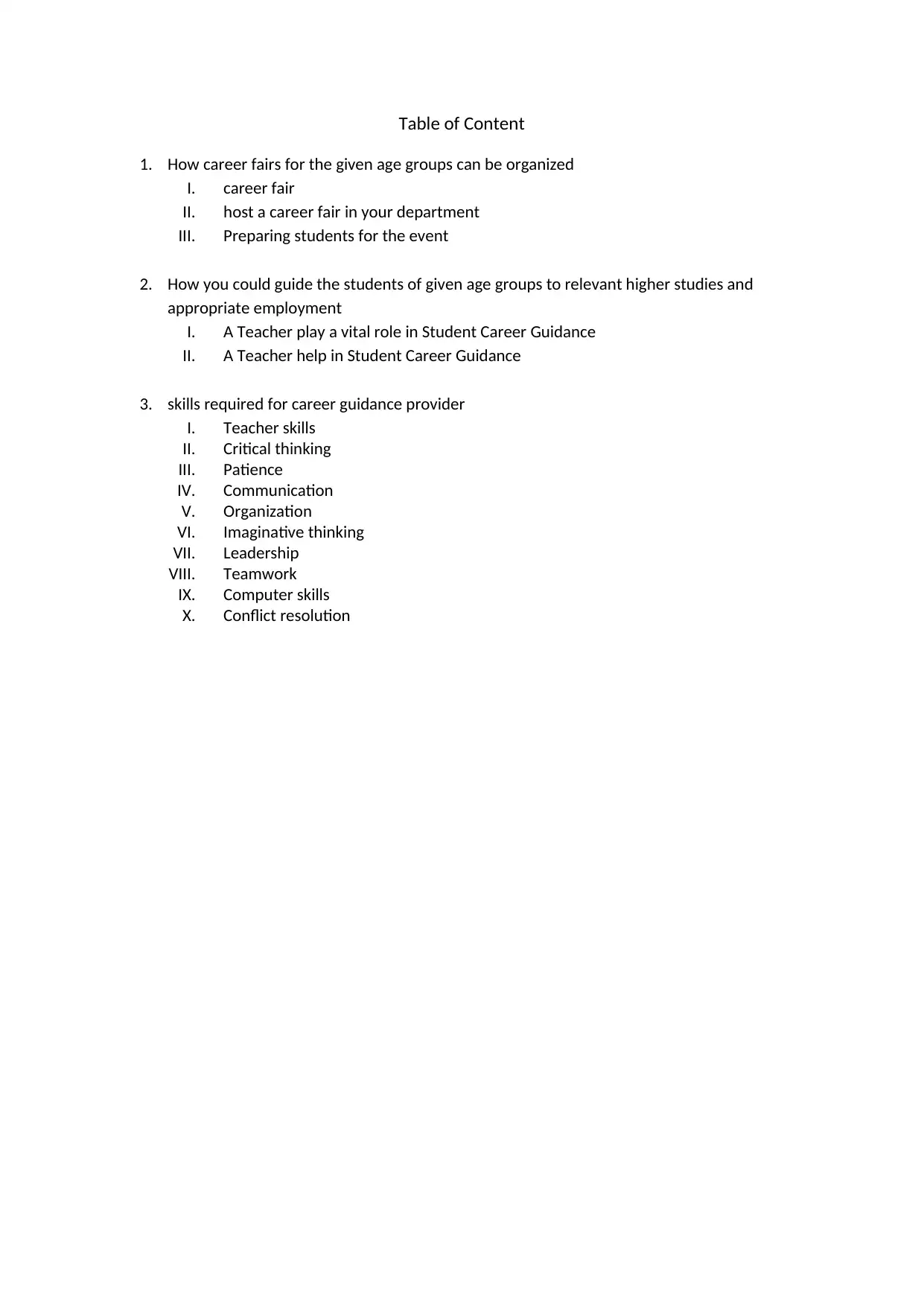
Table of Content
1. How career fairs for the given age groups can be organized
I. career fair
II. host a career fair in your department
III. Preparing students for the event
2. How you could guide the students of given age groups to relevant higher studies and
appropriate employment
I. A Teacher play a vital role in Student Career Guidance
II. A Teacher help in Student Career Guidance
3. skills required for career guidance provider
I. Teacher skills
II. Critical thinking
III. Patience
IV. Communication
V. Organization
VI. Imaginative thinking
VII. Leadership
VIII. Teamwork
IX. Computer skills
X. Conflict resolution
1. How career fairs for the given age groups can be organized
I. career fair
II. host a career fair in your department
III. Preparing students for the event
2. How you could guide the students of given age groups to relevant higher studies and
appropriate employment
I. A Teacher play a vital role in Student Career Guidance
II. A Teacher help in Student Career Guidance
3. skills required for career guidance provider
I. Teacher skills
II. Critical thinking
III. Patience
IV. Communication
V. Organization
VI. Imaginative thinking
VII. Leadership
VIII. Teamwork
IX. Computer skills
X. Conflict resolution
Secure Best Marks with AI Grader
Need help grading? Try our AI Grader for instant feedback on your assignments.
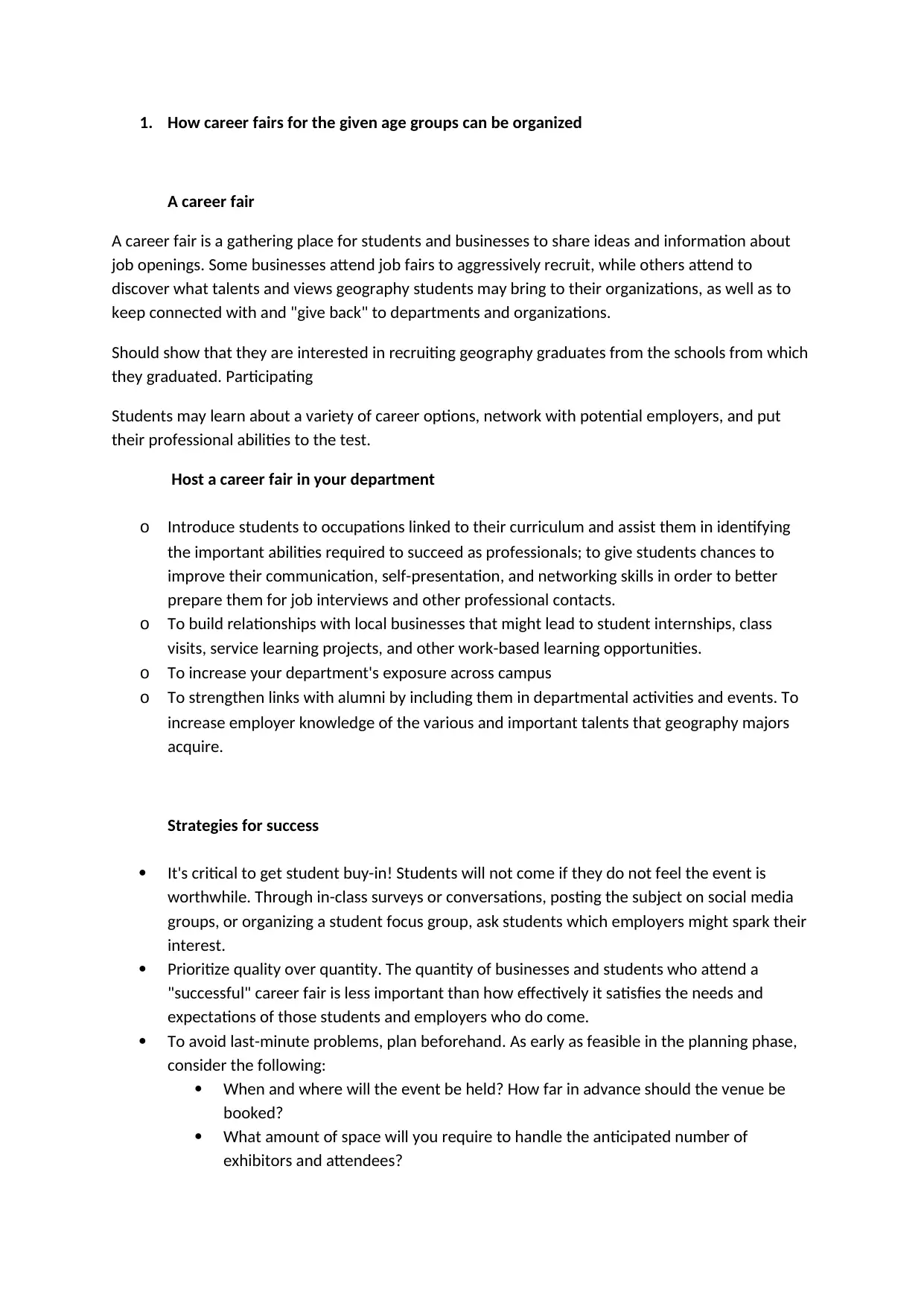
1. How career fairs for the given age groups can be organized
A career fair
A career fair is a gathering place for students and businesses to share ideas and information about
job openings. Some businesses attend job fairs to aggressively recruit, while others attend to
discover what talents and views geography students may bring to their organizations, as well as to
keep connected with and "give back" to departments and organizations.
Should show that they are interested in recruiting geography graduates from the schools from which
they graduated. Participating
Students may learn about a variety of career options, network with potential employers, and put
their professional abilities to the test.
Host a career fair in your department
o Introduce students to occupations linked to their curriculum and assist them in identifying
the important abilities required to succeed as professionals; to give students chances to
improve their communication, self-presentation, and networking skills in order to better
prepare them for job interviews and other professional contacts.
o To build relationships with local businesses that might lead to student internships, class
visits, service learning projects, and other work-based learning opportunities.
o To increase your department's exposure across campus
o To strengthen links with alumni by including them in departmental activities and events. To
increase employer knowledge of the various and important talents that geography majors
acquire.
Strategies for success
It's critical to get student buy-in! Students will not come if they do not feel the event is
worthwhile. Through in-class surveys or conversations, posting the subject on social media
groups, or organizing a student focus group, ask students which employers might spark their
interest.
Prioritize quality over quantity. The quantity of businesses and students who attend a
"successful" career fair is less important than how effectively it satisfies the needs and
expectations of those students and employers who do come.
To avoid last-minute problems, plan beforehand. As early as feasible in the planning phase,
consider the following:
When and where will the event be held? How far in advance should the venue be
booked?
What amount of space will you require to handle the anticipated number of
exhibitors and attendees?
A career fair
A career fair is a gathering place for students and businesses to share ideas and information about
job openings. Some businesses attend job fairs to aggressively recruit, while others attend to
discover what talents and views geography students may bring to their organizations, as well as to
keep connected with and "give back" to departments and organizations.
Should show that they are interested in recruiting geography graduates from the schools from which
they graduated. Participating
Students may learn about a variety of career options, network with potential employers, and put
their professional abilities to the test.
Host a career fair in your department
o Introduce students to occupations linked to their curriculum and assist them in identifying
the important abilities required to succeed as professionals; to give students chances to
improve their communication, self-presentation, and networking skills in order to better
prepare them for job interviews and other professional contacts.
o To build relationships with local businesses that might lead to student internships, class
visits, service learning projects, and other work-based learning opportunities.
o To increase your department's exposure across campus
o To strengthen links with alumni by including them in departmental activities and events. To
increase employer knowledge of the various and important talents that geography majors
acquire.
Strategies for success
It's critical to get student buy-in! Students will not come if they do not feel the event is
worthwhile. Through in-class surveys or conversations, posting the subject on social media
groups, or organizing a student focus group, ask students which employers might spark their
interest.
Prioritize quality over quantity. The quantity of businesses and students who attend a
"successful" career fair is less important than how effectively it satisfies the needs and
expectations of those students and employers who do come.
To avoid last-minute problems, plan beforehand. As early as feasible in the planning phase,
consider the following:
When and where will the event be held? How far in advance should the venue be
booked?
What amount of space will you require to handle the anticipated number of
exhibitors and attendees?
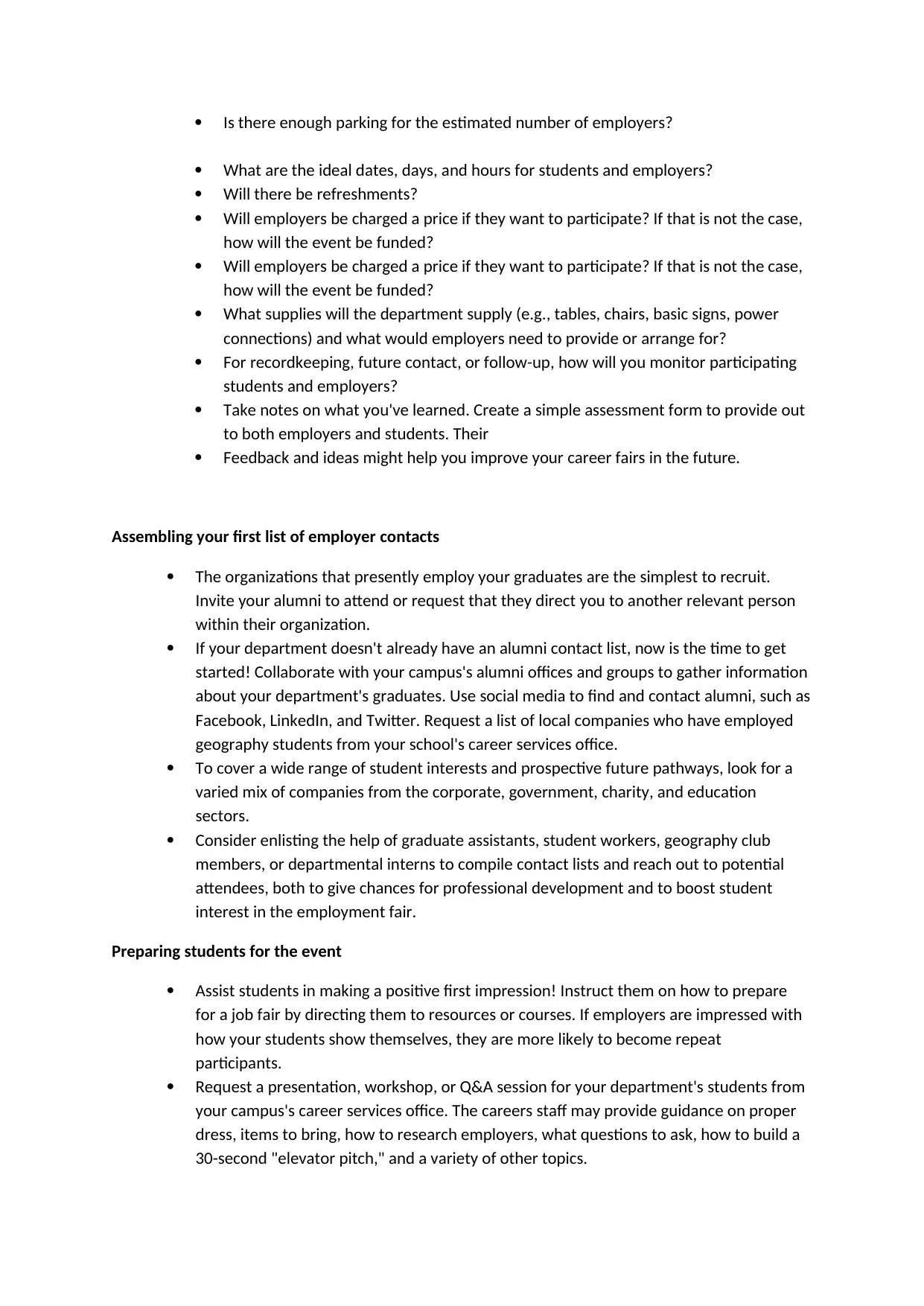
Is there enough parking for the estimated number of employers?
What are the ideal dates, days, and hours for students and employers?
Will there be refreshments?
Will employers be charged a price if they want to participate? If that is not the case,
how will the event be funded?
Will employers be charged a price if they want to participate? If that is not the case,
how will the event be funded?
What supplies will the department supply (e.g., tables, chairs, basic signs, power
connections) and what would employers need to provide or arrange for?
For recordkeeping, future contact, or follow-up, how will you monitor participating
students and employers?
Take notes on what you've learned. Create a simple assessment form to provide out
to both employers and students. Their
Feedback and ideas might help you improve your career fairs in the future.
Assembling your first list of employer contacts
The organizations that presently employ your graduates are the simplest to recruit.
Invite your alumni to attend or request that they direct you to another relevant person
within their organization.
If your department doesn't already have an alumni contact list, now is the time to get
started! Collaborate with your campus's alumni offices and groups to gather information
about your department's graduates. Use social media to find and contact alumni, such as
Facebook, LinkedIn, and Twitter. Request a list of local companies who have employed
geography students from your school's career services office.
To cover a wide range of student interests and prospective future pathways, look for a
varied mix of companies from the corporate, government, charity, and education
sectors.
Consider enlisting the help of graduate assistants, student workers, geography club
members, or departmental interns to compile contact lists and reach out to potential
attendees, both to give chances for professional development and to boost student
interest in the employment fair.
Preparing students for the event
Assist students in making a positive first impression! Instruct them on how to prepare
for a job fair by directing them to resources or courses. If employers are impressed with
how your students show themselves, they are more likely to become repeat
participants.
Request a presentation, workshop, or Q&A session for your department's students from
your campus's career services office. The careers staff may provide guidance on proper
dress, items to bring, how to research employers, what questions to ask, how to build a
30-second "elevator pitch," and a variety of other topics.
What are the ideal dates, days, and hours for students and employers?
Will there be refreshments?
Will employers be charged a price if they want to participate? If that is not the case,
how will the event be funded?
Will employers be charged a price if they want to participate? If that is not the case,
how will the event be funded?
What supplies will the department supply (e.g., tables, chairs, basic signs, power
connections) and what would employers need to provide or arrange for?
For recordkeeping, future contact, or follow-up, how will you monitor participating
students and employers?
Take notes on what you've learned. Create a simple assessment form to provide out
to both employers and students. Their
Feedback and ideas might help you improve your career fairs in the future.
Assembling your first list of employer contacts
The organizations that presently employ your graduates are the simplest to recruit.
Invite your alumni to attend or request that they direct you to another relevant person
within their organization.
If your department doesn't already have an alumni contact list, now is the time to get
started! Collaborate with your campus's alumni offices and groups to gather information
about your department's graduates. Use social media to find and contact alumni, such as
Facebook, LinkedIn, and Twitter. Request a list of local companies who have employed
geography students from your school's career services office.
To cover a wide range of student interests and prospective future pathways, look for a
varied mix of companies from the corporate, government, charity, and education
sectors.
Consider enlisting the help of graduate assistants, student workers, geography club
members, or departmental interns to compile contact lists and reach out to potential
attendees, both to give chances for professional development and to boost student
interest in the employment fair.
Preparing students for the event
Assist students in making a positive first impression! Instruct them on how to prepare
for a job fair by directing them to resources or courses. If employers are impressed with
how your students show themselves, they are more likely to become repeat
participants.
Request a presentation, workshop, or Q&A session for your department's students from
your campus's career services office. The careers staff may provide guidance on proper
dress, items to bring, how to research employers, what questions to ask, how to build a
30-second "elevator pitch," and a variety of other topics.
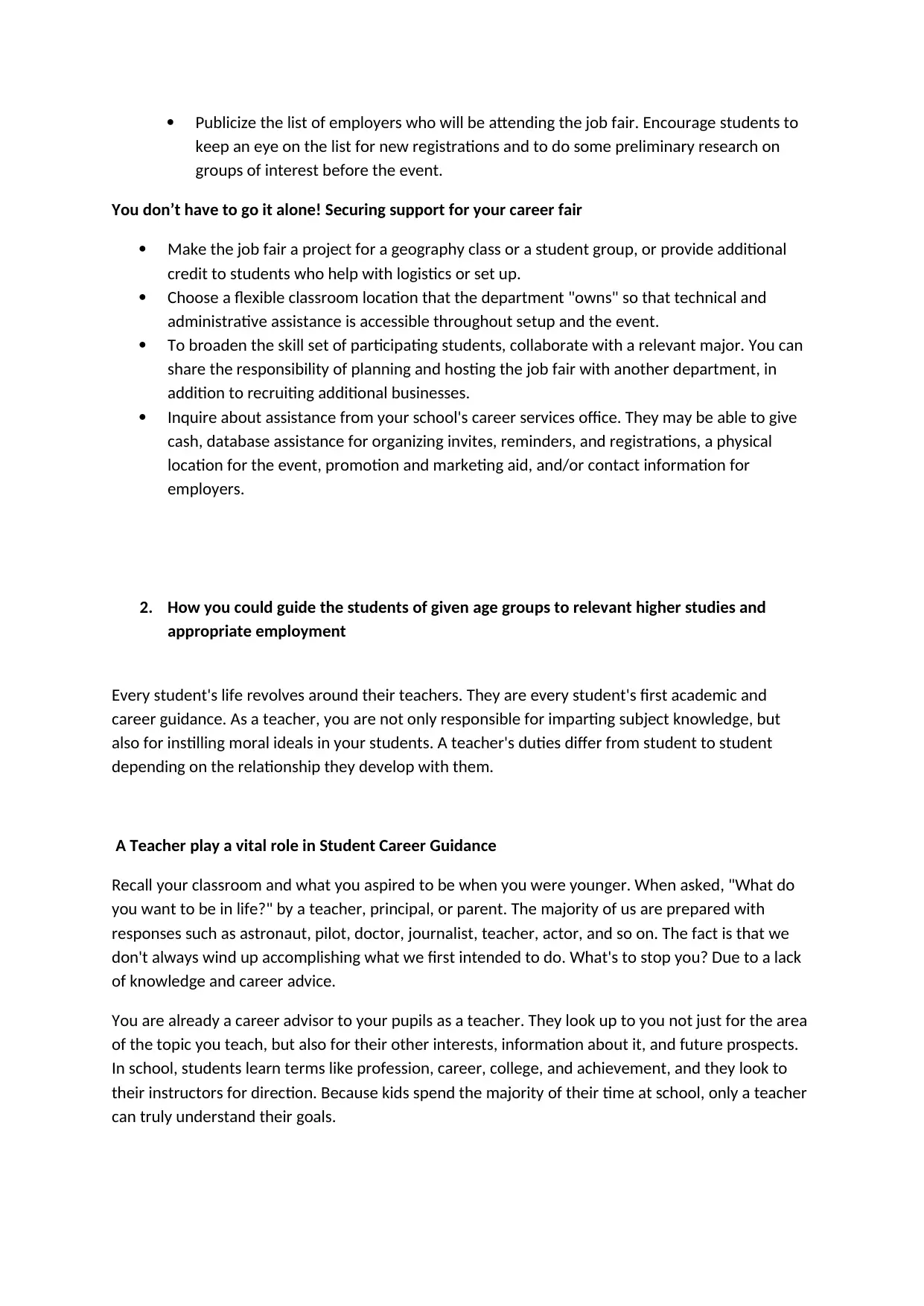
Publicize the list of employers who will be attending the job fair. Encourage students to
keep an eye on the list for new registrations and to do some preliminary research on
groups of interest before the event.
You don’t have to go it alone! Securing support for your career fair
Make the job fair a project for a geography class or a student group, or provide additional
credit to students who help with logistics or set up.
Choose a flexible classroom location that the department "owns" so that technical and
administrative assistance is accessible throughout setup and the event.
To broaden the skill set of participating students, collaborate with a relevant major. You can
share the responsibility of planning and hosting the job fair with another department, in
addition to recruiting additional businesses.
Inquire about assistance from your school's career services office. They may be able to give
cash, database assistance for organizing invites, reminders, and registrations, a physical
location for the event, promotion and marketing aid, and/or contact information for
employers.
2. How you could guide the students of given age groups to relevant higher studies and
appropriate employment
Every student's life revolves around their teachers. They are every student's first academic and
career guidance. As a teacher, you are not only responsible for imparting subject knowledge, but
also for instilling moral ideals in your students. A teacher's duties differ from student to student
depending on the relationship they develop with them.
A Teacher play a vital role in Student Career Guidance
Recall your classroom and what you aspired to be when you were younger. When asked, "What do
you want to be in life?" by a teacher, principal, or parent. The majority of us are prepared with
responses such as astronaut, pilot, doctor, journalist, teacher, actor, and so on. The fact is that we
don't always wind up accomplishing what we first intended to do. What's to stop you? Due to a lack
of knowledge and career advice.
You are already a career advisor to your pupils as a teacher. They look up to you not just for the area
of the topic you teach, but also for their other interests, information about it, and future prospects.
In school, students learn terms like profession, career, college, and achievement, and they look to
their instructors for direction. Because kids spend the majority of their time at school, only a teacher
can truly understand their goals.
keep an eye on the list for new registrations and to do some preliminary research on
groups of interest before the event.
You don’t have to go it alone! Securing support for your career fair
Make the job fair a project for a geography class or a student group, or provide additional
credit to students who help with logistics or set up.
Choose a flexible classroom location that the department "owns" so that technical and
administrative assistance is accessible throughout setup and the event.
To broaden the skill set of participating students, collaborate with a relevant major. You can
share the responsibility of planning and hosting the job fair with another department, in
addition to recruiting additional businesses.
Inquire about assistance from your school's career services office. They may be able to give
cash, database assistance for organizing invites, reminders, and registrations, a physical
location for the event, promotion and marketing aid, and/or contact information for
employers.
2. How you could guide the students of given age groups to relevant higher studies and
appropriate employment
Every student's life revolves around their teachers. They are every student's first academic and
career guidance. As a teacher, you are not only responsible for imparting subject knowledge, but
also for instilling moral ideals in your students. A teacher's duties differ from student to student
depending on the relationship they develop with them.
A Teacher play a vital role in Student Career Guidance
Recall your classroom and what you aspired to be when you were younger. When asked, "What do
you want to be in life?" by a teacher, principal, or parent. The majority of us are prepared with
responses such as astronaut, pilot, doctor, journalist, teacher, actor, and so on. The fact is that we
don't always wind up accomplishing what we first intended to do. What's to stop you? Due to a lack
of knowledge and career advice.
You are already a career advisor to your pupils as a teacher. They look up to you not just for the area
of the topic you teach, but also for their other interests, information about it, and future prospects.
In school, students learn terms like profession, career, college, and achievement, and they look to
their instructors for direction. Because kids spend the majority of their time at school, only a teacher
can truly understand their goals.
Secure Best Marks with AI Grader
Need help grading? Try our AI Grader for instant feedback on your assignments.
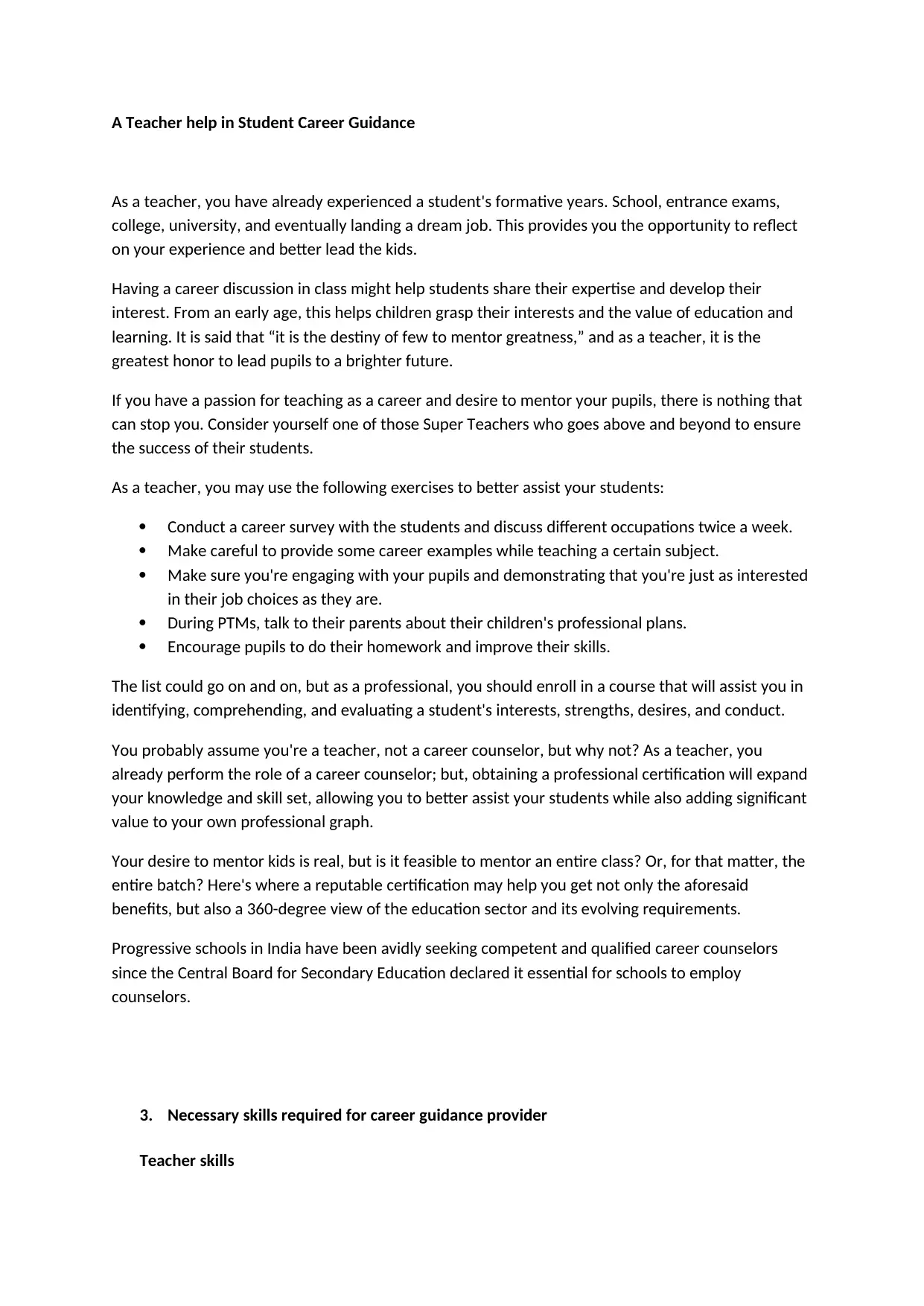
A Teacher help in Student Career Guidance
As a teacher, you have already experienced a student's formative years. School, entrance exams,
college, university, and eventually landing a dream job. This provides you the opportunity to reflect
on your experience and better lead the kids.
Having a career discussion in class might help students share their expertise and develop their
interest. From an early age, this helps children grasp their interests and the value of education and
learning. It is said that “it is the destiny of few to mentor greatness,” and as a teacher, it is the
greatest honor to lead pupils to a brighter future.
If you have a passion for teaching as a career and desire to mentor your pupils, there is nothing that
can stop you. Consider yourself one of those Super Teachers who goes above and beyond to ensure
the success of their students.
As a teacher, you may use the following exercises to better assist your students:
Conduct a career survey with the students and discuss different occupations twice a week.
Make careful to provide some career examples while teaching a certain subject.
Make sure you're engaging with your pupils and demonstrating that you're just as interested
in their job choices as they are.
During PTMs, talk to their parents about their children's professional plans.
Encourage pupils to do their homework and improve their skills.
The list could go on and on, but as a professional, you should enroll in a course that will assist you in
identifying, comprehending, and evaluating a student's interests, strengths, desires, and conduct.
You probably assume you're a teacher, not a career counselor, but why not? As a teacher, you
already perform the role of a career counselor; but, obtaining a professional certification will expand
your knowledge and skill set, allowing you to better assist your students while also adding significant
value to your own professional graph.
Your desire to mentor kids is real, but is it feasible to mentor an entire class? Or, for that matter, the
entire batch? Here's where a reputable certification may help you get not only the aforesaid
benefits, but also a 360-degree view of the education sector and its evolving requirements.
Progressive schools in India have been avidly seeking competent and qualified career counselors
since the Central Board for Secondary Education declared it essential for schools to employ
counselors.
3. Necessary skills required for career guidance provider
Teacher skills
As a teacher, you have already experienced a student's formative years. School, entrance exams,
college, university, and eventually landing a dream job. This provides you the opportunity to reflect
on your experience and better lead the kids.
Having a career discussion in class might help students share their expertise and develop their
interest. From an early age, this helps children grasp their interests and the value of education and
learning. It is said that “it is the destiny of few to mentor greatness,” and as a teacher, it is the
greatest honor to lead pupils to a brighter future.
If you have a passion for teaching as a career and desire to mentor your pupils, there is nothing that
can stop you. Consider yourself one of those Super Teachers who goes above and beyond to ensure
the success of their students.
As a teacher, you may use the following exercises to better assist your students:
Conduct a career survey with the students and discuss different occupations twice a week.
Make careful to provide some career examples while teaching a certain subject.
Make sure you're engaging with your pupils and demonstrating that you're just as interested
in their job choices as they are.
During PTMs, talk to their parents about their children's professional plans.
Encourage pupils to do their homework and improve their skills.
The list could go on and on, but as a professional, you should enroll in a course that will assist you in
identifying, comprehending, and evaluating a student's interests, strengths, desires, and conduct.
You probably assume you're a teacher, not a career counselor, but why not? As a teacher, you
already perform the role of a career counselor; but, obtaining a professional certification will expand
your knowledge and skill set, allowing you to better assist your students while also adding significant
value to your own professional graph.
Your desire to mentor kids is real, but is it feasible to mentor an entire class? Or, for that matter, the
entire batch? Here's where a reputable certification may help you get not only the aforesaid
benefits, but also a 360-degree view of the education sector and its evolving requirements.
Progressive schools in India have been avidly seeking competent and qualified career counselors
since the Central Board for Secondary Education declared it essential for schools to employ
counselors.
3. Necessary skills required for career guidance provider
Teacher skills
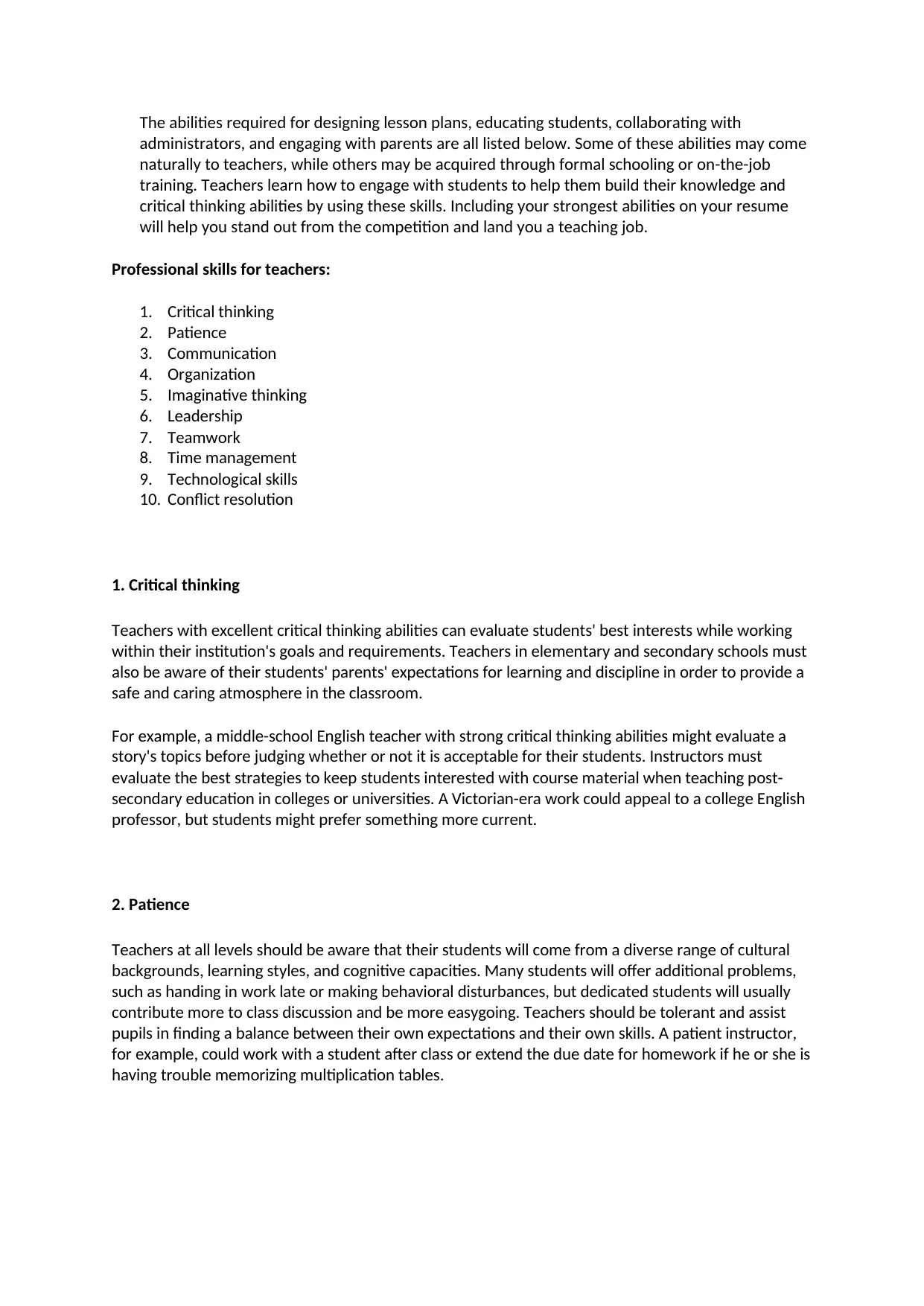
The abilities required for designing lesson plans, educating students, collaborating with
administrators, and engaging with parents are all listed below. Some of these abilities may come
naturally to teachers, while others may be acquired through formal schooling or on-the-job
training. Teachers learn how to engage with students to help them build their knowledge and
critical thinking abilities by using these skills. Including your strongest abilities on your resume
will help you stand out from the competition and land you a teaching job.
Professional skills for teachers:
1. Critical thinking
2. Patience
3. Communication
4. Organization
5. Imaginative thinking
6. Leadership
7. Teamwork
8. Time management
9. Technological skills
10. Conflict resolution
1. Critical thinking
Teachers with excellent critical thinking abilities can evaluate students' best interests while working
within their institution's goals and requirements. Teachers in elementary and secondary schools must
also be aware of their students' parents' expectations for learning and discipline in order to provide a
safe and caring atmosphere in the classroom.
For example, a middle-school English teacher with strong critical thinking abilities might evaluate a
story's topics before judging whether or not it is acceptable for their students. Instructors must
evaluate the best strategies to keep students interested with course material when teaching post-
secondary education in colleges or universities. A Victorian-era work could appeal to a college English
professor, but students might prefer something more current.
2. Patience
Teachers at all levels should be aware that their students will come from a diverse range of cultural
backgrounds, learning styles, and cognitive capacities. Many students will offer additional problems,
such as handing in work late or making behavioral disturbances, but dedicated students will usually
contribute more to class discussion and be more easygoing. Teachers should be tolerant and assist
pupils in finding a balance between their own expectations and their own skills. A patient instructor,
for example, could work with a student after class or extend the due date for homework if he or she is
having trouble memorizing multiplication tables.
administrators, and engaging with parents are all listed below. Some of these abilities may come
naturally to teachers, while others may be acquired through formal schooling or on-the-job
training. Teachers learn how to engage with students to help them build their knowledge and
critical thinking abilities by using these skills. Including your strongest abilities on your resume
will help you stand out from the competition and land you a teaching job.
Professional skills for teachers:
1. Critical thinking
2. Patience
3. Communication
4. Organization
5. Imaginative thinking
6. Leadership
7. Teamwork
8. Time management
9. Technological skills
10. Conflict resolution
1. Critical thinking
Teachers with excellent critical thinking abilities can evaluate students' best interests while working
within their institution's goals and requirements. Teachers in elementary and secondary schools must
also be aware of their students' parents' expectations for learning and discipline in order to provide a
safe and caring atmosphere in the classroom.
For example, a middle-school English teacher with strong critical thinking abilities might evaluate a
story's topics before judging whether or not it is acceptable for their students. Instructors must
evaluate the best strategies to keep students interested with course material when teaching post-
secondary education in colleges or universities. A Victorian-era work could appeal to a college English
professor, but students might prefer something more current.
2. Patience
Teachers at all levels should be aware that their students will come from a diverse range of cultural
backgrounds, learning styles, and cognitive capacities. Many students will offer additional problems,
such as handing in work late or making behavioral disturbances, but dedicated students will usually
contribute more to class discussion and be more easygoing. Teachers should be tolerant and assist
pupils in finding a balance between their own expectations and their own skills. A patient instructor,
for example, could work with a student after class or extend the due date for homework if he or she is
having trouble memorizing multiplication tables.
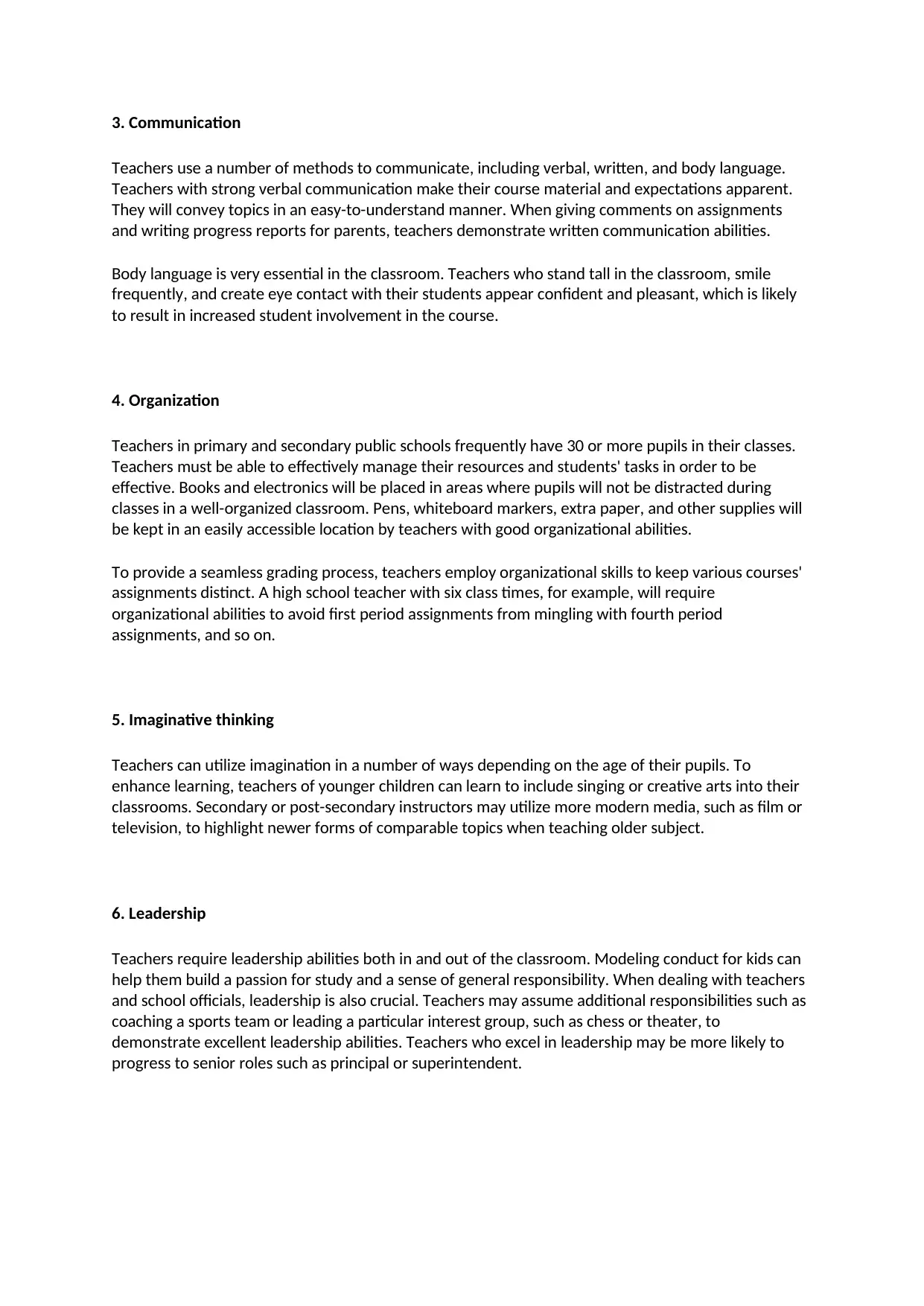
3. Communication
Teachers use a number of methods to communicate, including verbal, written, and body language.
Teachers with strong verbal communication make their course material and expectations apparent.
They will convey topics in an easy-to-understand manner. When giving comments on assignments
and writing progress reports for parents, teachers demonstrate written communication abilities.
Body language is very essential in the classroom. Teachers who stand tall in the classroom, smile
frequently, and create eye contact with their students appear confident and pleasant, which is likely
to result in increased student involvement in the course.
4. Organization
Teachers in primary and secondary public schools frequently have 30 or more pupils in their classes.
Teachers must be able to effectively manage their resources and students' tasks in order to be
effective. Books and electronics will be placed in areas where pupils will not be distracted during
classes in a well-organized classroom. Pens, whiteboard markers, extra paper, and other supplies will
be kept in an easily accessible location by teachers with good organizational abilities.
To provide a seamless grading process, teachers employ organizational skills to keep various courses'
assignments distinct. A high school teacher with six class times, for example, will require
organizational abilities to avoid first period assignments from mingling with fourth period
assignments, and so on.
5. Imaginative thinking
Teachers can utilize imagination in a number of ways depending on the age of their pupils. To
enhance learning, teachers of younger children can learn to include singing or creative arts into their
classrooms. Secondary or post-secondary instructors may utilize more modern media, such as film or
television, to highlight newer forms of comparable topics when teaching older subject.
6. Leadership
Teachers require leadership abilities both in and out of the classroom. Modeling conduct for kids can
help them build a passion for study and a sense of general responsibility. When dealing with teachers
and school officials, leadership is also crucial. Teachers may assume additional responsibilities such as
coaching a sports team or leading a particular interest group, such as chess or theater, to
demonstrate excellent leadership abilities. Teachers who excel in leadership may be more likely to
progress to senior roles such as principal or superintendent.
Teachers use a number of methods to communicate, including verbal, written, and body language.
Teachers with strong verbal communication make their course material and expectations apparent.
They will convey topics in an easy-to-understand manner. When giving comments on assignments
and writing progress reports for parents, teachers demonstrate written communication abilities.
Body language is very essential in the classroom. Teachers who stand tall in the classroom, smile
frequently, and create eye contact with their students appear confident and pleasant, which is likely
to result in increased student involvement in the course.
4. Organization
Teachers in primary and secondary public schools frequently have 30 or more pupils in their classes.
Teachers must be able to effectively manage their resources and students' tasks in order to be
effective. Books and electronics will be placed in areas where pupils will not be distracted during
classes in a well-organized classroom. Pens, whiteboard markers, extra paper, and other supplies will
be kept in an easily accessible location by teachers with good organizational abilities.
To provide a seamless grading process, teachers employ organizational skills to keep various courses'
assignments distinct. A high school teacher with six class times, for example, will require
organizational abilities to avoid first period assignments from mingling with fourth period
assignments, and so on.
5. Imaginative thinking
Teachers can utilize imagination in a number of ways depending on the age of their pupils. To
enhance learning, teachers of younger children can learn to include singing or creative arts into their
classrooms. Secondary or post-secondary instructors may utilize more modern media, such as film or
television, to highlight newer forms of comparable topics when teaching older subject.
6. Leadership
Teachers require leadership abilities both in and out of the classroom. Modeling conduct for kids can
help them build a passion for study and a sense of general responsibility. When dealing with teachers
and school officials, leadership is also crucial. Teachers may assume additional responsibilities such as
coaching a sports team or leading a particular interest group, such as chess or theater, to
demonstrate excellent leadership abilities. Teachers who excel in leadership may be more likely to
progress to senior roles such as principal or superintendent.
Paraphrase This Document
Need a fresh take? Get an instant paraphrase of this document with our AI Paraphraser
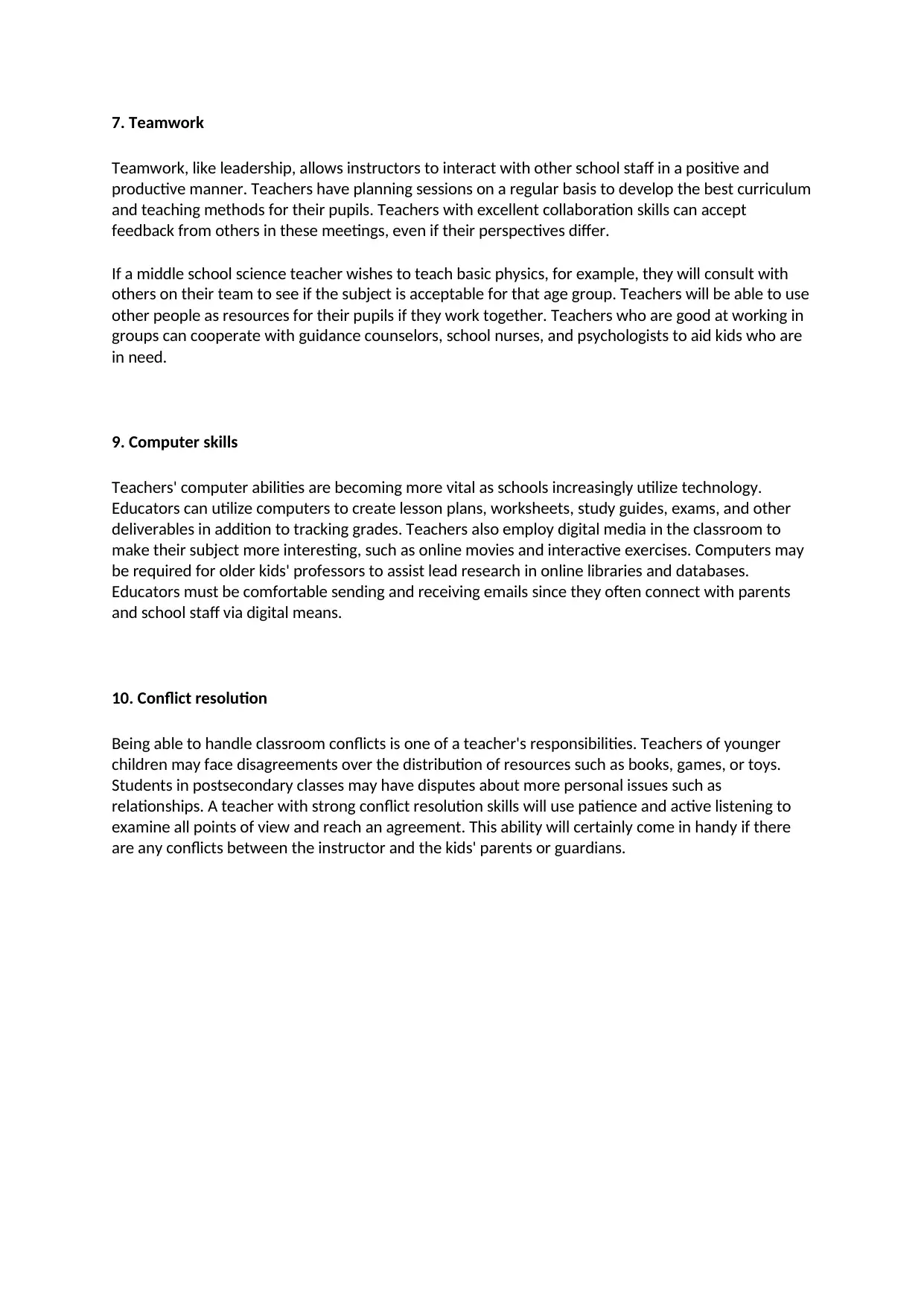
7. Teamwork
Teamwork, like leadership, allows instructors to interact with other school staff in a positive and
productive manner. Teachers have planning sessions on a regular basis to develop the best curriculum
and teaching methods for their pupils. Teachers with excellent collaboration skills can accept
feedback from others in these meetings, even if their perspectives differ.
If a middle school science teacher wishes to teach basic physics, for example, they will consult with
others on their team to see if the subject is acceptable for that age group. Teachers will be able to use
other people as resources for their pupils if they work together. Teachers who are good at working in
groups can cooperate with guidance counselors, school nurses, and psychologists to aid kids who are
in need.
9. Computer skills
Teachers' computer abilities are becoming more vital as schools increasingly utilize technology.
Educators can utilize computers to create lesson plans, worksheets, study guides, exams, and other
deliverables in addition to tracking grades. Teachers also employ digital media in the classroom to
make their subject more interesting, such as online movies and interactive exercises. Computers may
be required for older kids' professors to assist lead research in online libraries and databases.
Educators must be comfortable sending and receiving emails since they often connect with parents
and school staff via digital means.
10. Conflict resolution
Being able to handle classroom conflicts is one of a teacher's responsibilities. Teachers of younger
children may face disagreements over the distribution of resources such as books, games, or toys.
Students in postsecondary classes may have disputes about more personal issues such as
relationships. A teacher with strong conflict resolution skills will use patience and active listening to
examine all points of view and reach an agreement. This ability will certainly come in handy if there
are any conflicts between the instructor and the kids' parents or guardians.
Teamwork, like leadership, allows instructors to interact with other school staff in a positive and
productive manner. Teachers have planning sessions on a regular basis to develop the best curriculum
and teaching methods for their pupils. Teachers with excellent collaboration skills can accept
feedback from others in these meetings, even if their perspectives differ.
If a middle school science teacher wishes to teach basic physics, for example, they will consult with
others on their team to see if the subject is acceptable for that age group. Teachers will be able to use
other people as resources for their pupils if they work together. Teachers who are good at working in
groups can cooperate with guidance counselors, school nurses, and psychologists to aid kids who are
in need.
9. Computer skills
Teachers' computer abilities are becoming more vital as schools increasingly utilize technology.
Educators can utilize computers to create lesson plans, worksheets, study guides, exams, and other
deliverables in addition to tracking grades. Teachers also employ digital media in the classroom to
make their subject more interesting, such as online movies and interactive exercises. Computers may
be required for older kids' professors to assist lead research in online libraries and databases.
Educators must be comfortable sending and receiving emails since they often connect with parents
and school staff via digital means.
10. Conflict resolution
Being able to handle classroom conflicts is one of a teacher's responsibilities. Teachers of younger
children may face disagreements over the distribution of resources such as books, games, or toys.
Students in postsecondary classes may have disputes about more personal issues such as
relationships. A teacher with strong conflict resolution skills will use patience and active listening to
examine all points of view and reach an agreement. This ability will certainly come in handy if there
are any conflicts between the instructor and the kids' parents or guardians.
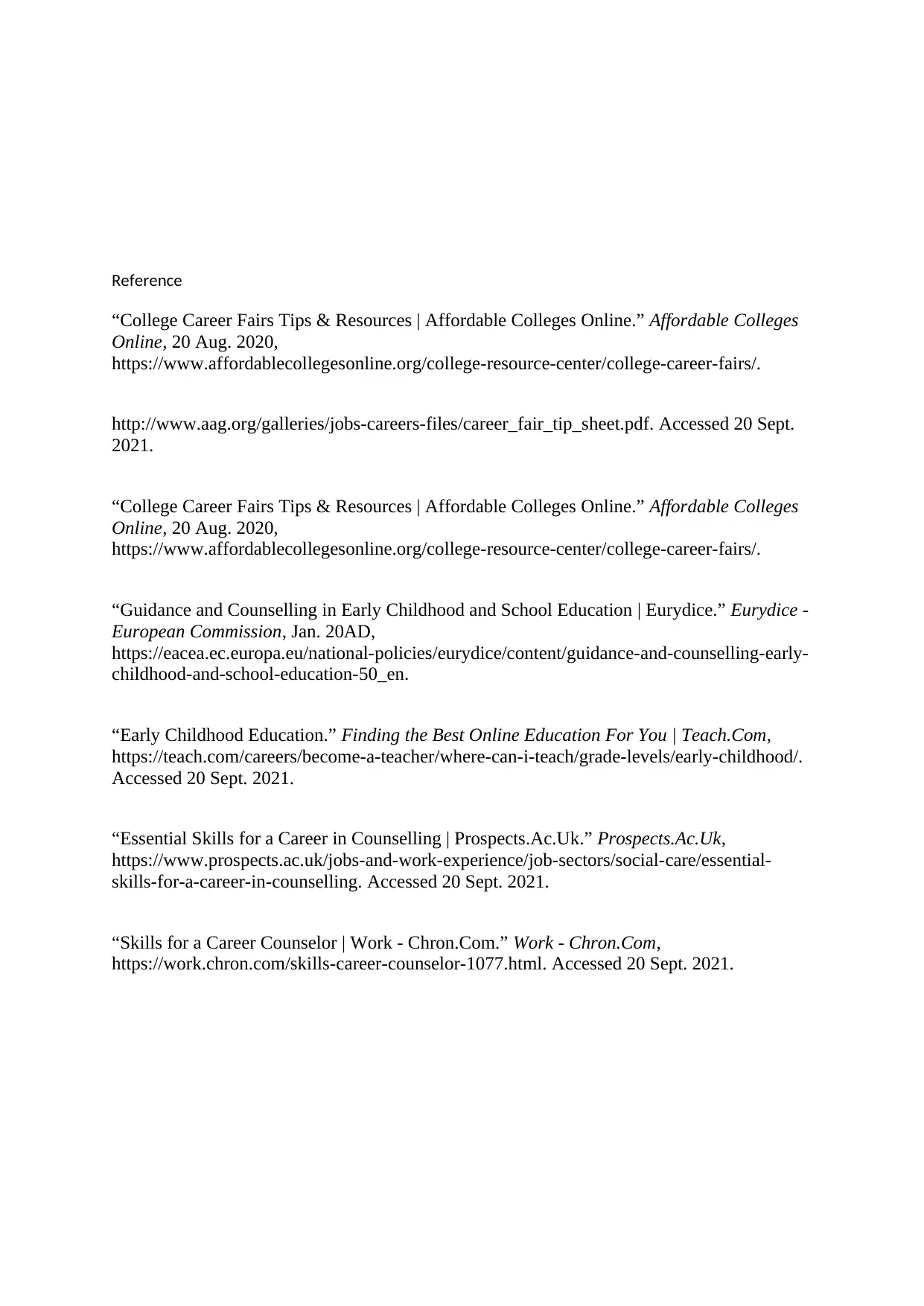
Reference
“College Career Fairs Tips & Resources | Affordable Colleges Online.” Affordable Colleges
Online, 20 Aug. 2020,
https://www.affordablecollegesonline.org/college-resource-center/college-career-fairs/.
http://www.aag.org/galleries/jobs-careers-files/career_fair_tip_sheet.pdf. Accessed 20 Sept.
2021.
“College Career Fairs Tips & Resources | Affordable Colleges Online.” Affordable Colleges
Online, 20 Aug. 2020,
https://www.affordablecollegesonline.org/college-resource-center/college-career-fairs/.
“Guidance and Counselling in Early Childhood and School Education | Eurydice.” Eurydice -
European Commission, Jan. 20AD,
https://eacea.ec.europa.eu/national-policies/eurydice/content/guidance-and-counselling-early-
childhood-and-school-education-50_en.
“Early Childhood Education.” Finding the Best Online Education For You | Teach.Com,
https://teach.com/careers/become-a-teacher/where-can-i-teach/grade-levels/early-childhood/.
Accessed 20 Sept. 2021.
“Essential Skills for a Career in Counselling | Prospects.Ac.Uk.” Prospects.Ac.Uk,
https://www.prospects.ac.uk/jobs-and-work-experience/job-sectors/social-care/essential-
skills-for-a-career-in-counselling. Accessed 20 Sept. 2021.
“Skills for a Career Counselor | Work - Chron.Com.” Work - Chron.Com,
https://work.chron.com/skills-career-counselor-1077.html. Accessed 20 Sept. 2021.
“College Career Fairs Tips & Resources | Affordable Colleges Online.” Affordable Colleges
Online, 20 Aug. 2020,
https://www.affordablecollegesonline.org/college-resource-center/college-career-fairs/.
http://www.aag.org/galleries/jobs-careers-files/career_fair_tip_sheet.pdf. Accessed 20 Sept.
2021.
“College Career Fairs Tips & Resources | Affordable Colleges Online.” Affordable Colleges
Online, 20 Aug. 2020,
https://www.affordablecollegesonline.org/college-resource-center/college-career-fairs/.
“Guidance and Counselling in Early Childhood and School Education | Eurydice.” Eurydice -
European Commission, Jan. 20AD,
https://eacea.ec.europa.eu/national-policies/eurydice/content/guidance-and-counselling-early-
childhood-and-school-education-50_en.
“Early Childhood Education.” Finding the Best Online Education For You | Teach.Com,
https://teach.com/careers/become-a-teacher/where-can-i-teach/grade-levels/early-childhood/.
Accessed 20 Sept. 2021.
“Essential Skills for a Career in Counselling | Prospects.Ac.Uk.” Prospects.Ac.Uk,
https://www.prospects.ac.uk/jobs-and-work-experience/job-sectors/social-care/essential-
skills-for-a-career-in-counselling. Accessed 20 Sept. 2021.
“Skills for a Career Counselor | Work - Chron.Com.” Work - Chron.Com,
https://work.chron.com/skills-career-counselor-1077.html. Accessed 20 Sept. 2021.
1 out of 9
Related Documents
Your All-in-One AI-Powered Toolkit for Academic Success.
+13062052269
info@desklib.com
Available 24*7 on WhatsApp / Email
![[object Object]](/_next/static/media/star-bottom.7253800d.svg)
Unlock your academic potential
© 2024 | Zucol Services PVT LTD | All rights reserved.




